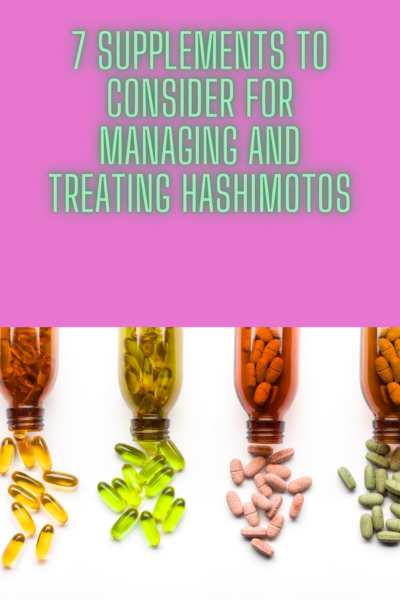Introduction:
Supplements for Hashimoto’s can be a tricky thing to figure out. I know it took me awhile to finally get my supplements for Hashimoto’s routine figured out so that it works for me. Hashimoto’s Thyroiditis is an autoimmune condition that affects the thyroid gland, leading to an underactive thyroid (hypothyroidism). In addition it also causes issues with your immune system. Managing Hashimoto’s involves a holistic approach, including lifestyle changes and dietary modifications. In addition to these, incorporating supplements into your routine can play a crucial role in supporting thyroid health and alleviating symptoms. In this blog post, I’ll explore some key supplements that may benefit individuals with Hashimoto’s Thyroiditis. Plus I will share with you what I take and why you should consider them as well.
- Selenium:
Selenium is an essential mineral that acts as a cofactor for enzymes involved in the production and metabolism of thyroid hormones. Studies suggest that selenium supplementation may help reduce inflammation in the thyroid gland and improve overall thyroid function in individuals with Hashimoto’s. Foods rich in selenium include Brazil nuts, sunflower seeds, and fish, but supplements can be a convenient way to ensure adequate intake. I personally have experimented with taking a selinum supplement, taking a thyroid specific supplement that includes selinum and just eating more Brazil nuts and sunflower seeds. I’ve found that taking the thyroid specific supplement and then also incorprating foods with seliminum in them works the best for me.
- Vitamin D:
Vitamin D plays a crucial role in immune system regulation, and deficiency has been linked to autoimmune diseases, including Hashimoto’s. Adequate levels of vitamin D may help modulate the immune response and reduce inflammation. Exposure to sunlight is a natural source of vitamin D, but supplements may be necessary, especially in regions with limited sunlight or during the winter months. Most people have a tendency to be vitamin D deficient especially if you live in a colder climate area in the winter. If you aren’t sure if you need it, you can ask your doctor about getting tested. Although taking some extra Vitamin D can’t usually hurt.
- B Vitamins:
B vitamins, particularly B12 and B6, are important for thyroid function and overall energy metabolism. Individuals with Hashimoto’s may experience fatigue, and supplementing with B vitamins can help address this symptom. Foods rich in B vitamins include leafy greens, meat, and dairy, but supplements can be beneficial for those with absorption issues.
- Omega-3 Fatty Acids:
Omega-3 fatty acids, found in fatty fish like salmon and flaxseeds, have anti-inflammatory properties. Including omega-3 supplements in your diet may help reduce inflammation associated with Hashimoto’s and support overall immune health. It’s essential to maintain a balance between omega-3 and omega-6 fatty acids for optimal results. I’ve found that eating fish a few times per week as well as taking an omega fish oil supplement really helps me.
- Probiotics:
The gut microbiome plays a significant role in immune system regulation, and imbalances have been linked to autoimmune conditions. Probiotic supplements can help promote a healthy gut microbiome, potentially reducing inflammation and supporting overall immune function. Yogurt, kefir, and fermented foods are also good dietary sources of probiotics.
Conclusion:
Supplements can be valuable additions to a comprehensive approach to managing Hashimoto’s Thyroiditis. However, it’s crucial to consult with a healthcare professional before incorporating new supplements into your routine, as individual needs may vary. Additionally, supplements should complement a well-balanced diet and lifestyle changes aimed at supporting overall health and managing Hashimoto’s symptoms effectively. Remember that a holistic approach that addresses various aspects of health is key to thriving with Hashimoto’s Thyroiditis.
Check out the thyroid supplement I take. It has made a big difference for me. (not an affiliate link or anything, just the best one I’ve found for me.)

Did this help you? If so, I would greatly appreciate a share on Facebook, twitter, linkedin, or pinterest.
My Favorite Products (Affiliate links- if you make a purchase I may earn a small commission)
Thrive Market - healthy gluten free, sugar free and speciality online food and household products
Silk and Sonder Monthly Journals and Planners
My Portable Infrared Sauna
Self Care Journal
Martie discounted food
Olipop - healthy soda with probiotics and prebiotics
Digestion Kit
Stress Oils








